Even before Aleksandr Solzhenitsyn confessed that in his years of exile in the United States he had not taken up our habit of chatting at filling stations, Americans had decided to disdain him. He was some sort of autocrat or authoritarian, a theocrat, a self-ordained prophet, not to mention an ingrate who had unkind things to say about America and other western nations. If Daniel Mahoneys book does not cause us to rethink our opinions about Solzhenitsyn, its hard to imagine what could. Mahoneys open-minded and manifestly intelligent analysis of a wide array of Solzhenitsyns writings shows him to be an ardent, albeit measured and reasoned defender of constitutionalism and democratic freedom. He is also, as Mahoney puts it, a postmodern foundationalist, a thoughtful man who did not begin a Christian, but whose experience and reflections on human naturehis anthropological conclusionsled him to its embrace. Not ignorance of the West, of its politics and way of life and of its philosophic underpinnings, but precisely a profound understanding of these enables Mahoneys Solzhenitsyn to speak to the mind and heart of every human being.
Delba Winthrop, Harvard University, editor and translator of
Democracy in America
In the natural progression of the ripening of Solzhenitsyn criticism, what has been needed is a book by a political theorist who is at home in the vocabulary of political philosophy and fully familiar with the categories and concepts of that field. Daniel Mahoney fills this niche and his study advances Solzhenitsyn criticism not by small or even medium-sized increments, but by a quantum leap forward. Mahoneys book will stand as the book on Solzhenitsyns politics, precisely because it does not treat politics as a self-contained and free-standing entity, i.e., it does not tear the politics out of the overarching moral vision. This book is simply superb.
Edward E. Ericson Jr., author of Solzhenitsyn and the
Modern World
Through its penetrating and comprehensive assessment of Solzhenitsyns significance, Professor Mahoneys book is a lesson in human greatness as well as a powerful contribution to our understanding of modern tyranny.
Pierre Manent, Centre de Recherches Politiques
Raymond Aron, Paris, France
Daniel Mahoney states that his goal is to take Solzhenitsyn seriously. To this end he offers a splendid and always reliable analysis of the political, philosophical, and moral dimensions of Solzhenitsyns writings which demonstrates that contrary to widespread journalistic assumptions, Solzhenitsyn is deeply indebted to a long line of classic thinkers going all the way back to Plato and Aristotle.
Alexis Klimoff, Vassar College
Solzhenitsyns literary genius as a chronicler of the totalitarian past is universally recognized. Daniel Mahoney persuasively suggests that the great Russian witness and writer is also a serious political philosopher with important things to say about the democratic future.
George Weigel, Ethics and Public Policy Center
Everything Daniel Mahoney writes is worth reading and this book, in particular, shows how Solzhenitsyns vision is even more relevant today than it was in the dark days of the Soviet Occupation.
Michael Novak, American Enterprise Institute
In an age of uninhibited materialism and crass popular culture, where the demands of the fast-paced information age make us so busy we can entirely forget the spiritual realm, Mahoneys book on Solzhenitsyn is a refreshment for the soul. It reminds us that the most important possession of our time on earth is our character, and our character cannot be properly tended unless we allow it to pursue its longing for the true and eternal.
James F. Pontuso, author of Solzhenitsyns Political Thought
ALEKSANDR
SOLZHENITSYN
Twentieth-Century Political Thinkers
Series Editors: Kenneth L. Deutsch and Jean Bethke Elshtain
Raymond Aron: The Recovery of the Political
by Brian C. Anderson, American Enterprise Institute
Jacques Maritain: The Philosopher in Society
by James V. Schall, Georgetown University
Martin Buber: The Hidden Dialogue
by Dan Avnon, Hebrew University of Jerusalem
John Dewey: Americas Philosopher of Democracy
by David Fott, University of Nevada
Simone Weil: The Way of Justice as Compassion
by Richard H. Bell, The College of Wooster
Gandhi: Struggling for Autonomy
by Ronald J. Tercheck, University of Maryland at College Park
Paul Ricoeur: The Promise and Risk of Politics
by Bernard P. Dauenhauer, University of Georgia
Carl Schmitt: The End of Law
by William E. Scheuerman, University of Pittsburgh
Eric Voegelin: In Quest of Reality
by Thomas W. Heilke, University of Kansas
Yves R. Simon: Real Democracy
by Vukan Kuic, University of South Carolina
Jrgen Habermas: A PhilosophicalPolitical Profile
by Martin Beck Matutk, Purdue University
Aleksandr Solzhenitsyn: The Ascent from Ideology
by Daniel J. Mahoney, Assumption College
ALEKSANDR
SOLZHENITSYN
The Ascent from Ideology
DANIEL J. MAHONEY

ROWMAN & LITTLEFIELD PUBLISHERS, INC.
Published in the United States of America
by Rowman & Littlefield Publishers, Inc.
4720 Boston Way, Lanham, Maryland 20706
www.rowmanlittlefield.com
12 Hids Copse Road
Cumnor Hill, Oxford OX2 9JJ, England
Copyright 2001 by Rowman & Littlefield Publishers, Inc.
All rights reserved. No part of this publication may be reproduced, stored in a retrieval system, or transmitted in any form or by any means, electronic, mechanical, photocopying, recording, or otherwise, without the prior permission of the publisher.
British Library Cataloging in Publication Information Available
Library of Congress Cataloging-in-Publication Data
Mahoney, Daniel J., 1960
Aleksandr Solzhenitsyn : the ascent from ideology / Daniel J. Mahoney.
p. cm.
Includes bibliographical references and index.
ISBN 978-0-7425-2113-1
1. Solzhenitsyn, Aleksandr Isaevich, 1918Philosophy. 2. Solzhenitsyn, Aleksandr Isaevich, 1918Political and social views. I. Title.
PG3488.O4 Z766 2001
891.73'44dc21
2001019877
Printed in the United States of America
 The paper used in this publication meets the minimum requirements of American National Standard for Information SciencesPermanence of Paper for Printed Library Materials, ANSI/NISO Z39.48-1992.
The paper used in this publication meets the minimum requirements of American National Standard for Information SciencesPermanence of Paper for Printed Library Materials, ANSI/NISO Z39.48-1992.
CONTENTS
PREFACE AND ACKNOWLEDGMENTS
New Yorker editor David Remnick has effectively captured Aleksandr Solzhenitsyns paradoxical impact on the politics of our time:
In terms of the effect he has had on history, Solzhenitsyn is the dominant writer of the twentieth century. Who else compares? Orwell? Koestler?
And yet when his name comes up now, it is more often than not as a freak, a monarchist, a crank, a has-been.
Remnick has been the most influential of a small group of writers who have taken up the thankless task of responding to the systematic misrepresentations that dominate the Western reception of Solzhenitsyn. This book is indebted to the excellent labors of Remnick and Edward Ericson, writers who have carried out that task with scholarly diligence and the requisite love of truth. While also attempting to rescue Solzhenitsyn from systematic distortions, the present book aims more fundamentally to connect Solzhenitsyn to the larger tradition of Western political and philosophical reflection. The reader might be surprised by this aim since everyone knows that Solzhenitsyn is supposed to be a Slavophile. In the standard rendition, he is the ideological antithesis of those liberals and Westernizers, such as Andrei Sakharov, who are treated with great respect by the Western press. Solzhenitsyn is indeed a deeply Russian writer and thinker. But superficial Western commentators and critics forget that Russia belongs to a civilization that was also decisively shaped by the dialogue between Jerusalem and Athens. Solzhenitsyn, like Russian Christian pluralist thinkers of a century ago, such as Vladimir Solovyov and Sergei Bulgakov, is formed by an intellectual patrimony that is the common property of the East and West of Europe alike.
Next page

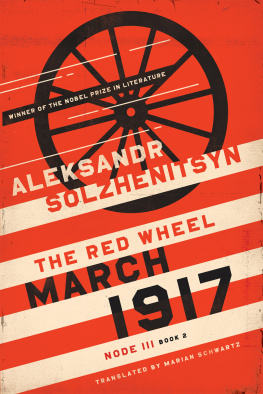
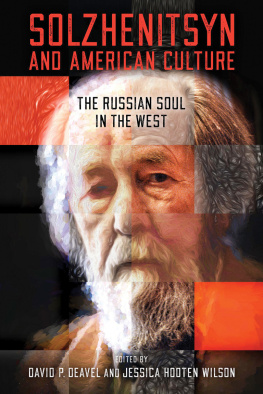
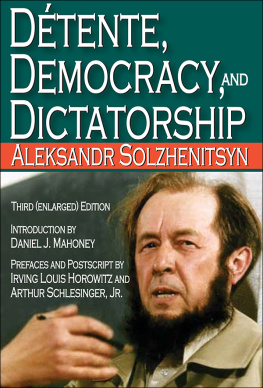

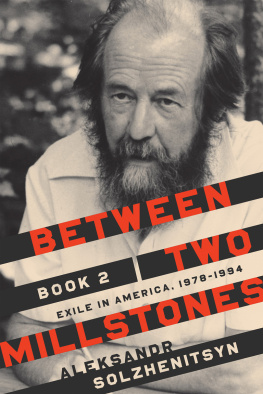
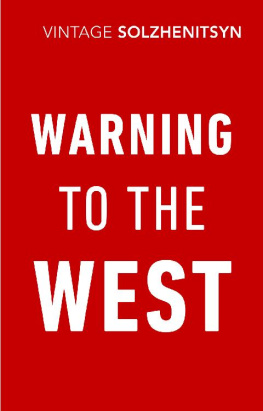
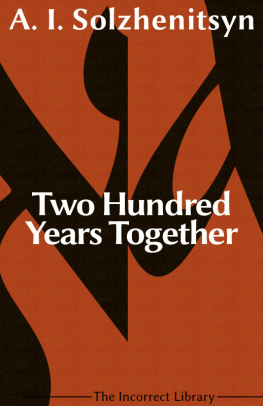
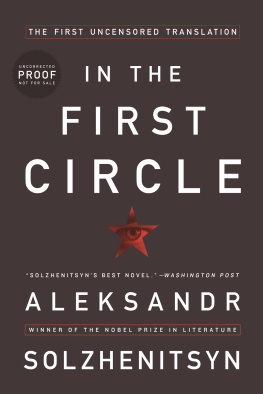
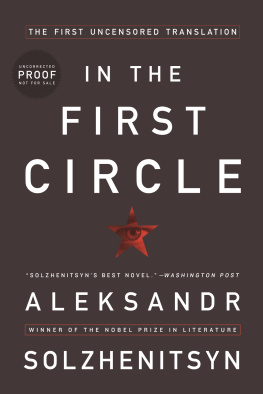
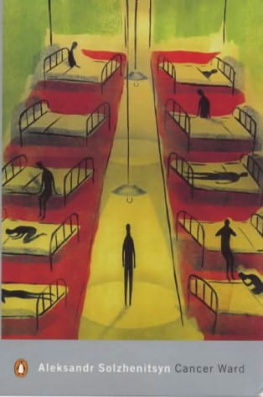
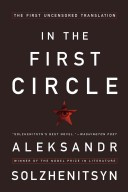

 The paper used in this publication meets the minimum requirements of American National Standard for Information SciencesPermanence of Paper for Printed Library Materials, ANSI/NISO Z39.48-1992.
The paper used in this publication meets the minimum requirements of American National Standard for Information SciencesPermanence of Paper for Printed Library Materials, ANSI/NISO Z39.48-1992.